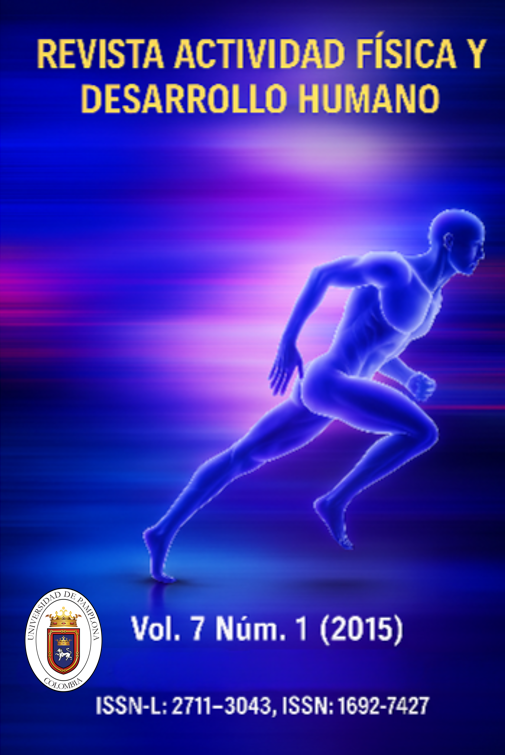Análisis cinemático y dinámico en el pateo en el futbol sala
DOI:
https://doi.org/10.24054/afdh.v7i1.1646Palabras clave:
Biomecánica, futbol salaResumen
La biomecánica deportiva ofrece una variedad de técnicas para el análisis cinemático y dinámico de un gesto deportivo, lo cual permite medir con precisión el nivel técnico de una ejecución para este caso el de un pateo y sus posibles aspectos a perfeccionar, lo que podría ayudar a tener un mejor rendimiento deportivo del jugador de futbol sala, en este sentido la biomecánica es importante para analizar y con base en tal análisis potenciar las cualidades de cualquier movimiento. Según lo expuesto anteriormente la investigación tuvo como finalidad el estudio cinemático y dinámico del pateo en el futbol sala, para el cual se utilizó el programa kinovea, y una cámara desde un plano sagital, permitiendo realizar un análisis del gesto en ejecución.
El presente artículo incluye cuatro ítems. Primero la formulación del problema la cual hace referencia a la importancia de realizar un análisis cinemático y dinámico del pateo en el futbol sala. A continuación el marco teórico en donde se visualiza la temática específica del trabajo como es: Qué es la biomecánica, la biomecánica en el deporte, centros de gravedad, dinámica del movimiento, cinemática de movimiento y características del fútbol sala. Posteriormente encontramos la metodología que se empleó para el desarrollo del trabajo. Finalmente se presenta la interpretación y análisis de resultados resaltando lo que se puede lograr con las facilidades que proporcionan los pocos equipos utilizados.
Descargas
Referencias
Acero, José. (2010). Cinemática bidimensional y (2D) y biplanar (2P) del gesto deportivo. Cali.
Agudelo, C. (2012). Planificación del entrenamiento deportivo por Modelamiento. Editorial Kinesis. Armenia 2012
Barbero Álvarez José. Carlos. (1998). El entrenamiento de los deportes de equipo basado en estudios biomecánicos (análisis cinemático) y fisiológicos (frecuencia cardíaca) de la competición. Revista digital Efdeportes, Año 3. Nº 11. Buenos Aires. http://www.efdeportes.com/efd11a/biomec.ht m
Donskoi, D.D, (1971). Biomecánica con fundamentos de la Técnica Deportiva. traducción de: SANTOS AMIGO, Mabel, editorial pueblo y educacion.1982 tomado de la edición en ruso de 1971.
Espinoza, Sanchez Matilde. (2005). Biomecánica Deportiva, disponible en: httpp://www.Sld.cu/galerías/pdf/sitios/rehabil itacion-equino/biomecanica.pdf. (fecha de acceso noviembre de 2011).
García-Fojeda, Alberto; Biosca, Francesc; Vàlios, Joan Carles. (1997).La biomecánica: una herramienta para la evaluación de la técnica deportiva. Apunts. Educación Física y Deportes, 47:15-20.
Izquierdo Redin, Mikel (2008). Biomecánica y bases neuromusculares de la actividad física y el deporte. Madrid, España: Médica Panamericana.
La enseñanza de los fundamentos técnicos del futbol y su incidencia en la participación en el campeonato escolar de la Escuela Benjamín Araujo de Patate en el año lectivo 2008 – 2009 .
Ramón Suárez, Gustavo (2006). Modelo biomecánico. Medellín, Colombia: VIREF Instituto de Educación Física, Universidad de Antioquia.
Ramón Suárez, Gustavo (2009). Biomecánica deportiva y control del entrenamiento. Medellín, Colombia: Universidad de Antioquia, Instituto Universitario de Educación Física.
Zabala Díaz, Mikel; García Artero, Enrique; Lozano, Luis; Lozano Cid, Javier; Soto Hermoso, Víctor M. (2006). Análisis de los golpeos de empeine y puntera en jugadores de élite de Futbol sala. Archivos de Medicina del Deporte, 23 (114): 274-282. http://www.efisioterapia.net/articulos/analisis-biomecanico-del-golpeo-balon-futbol
Descargas
Publicado
Número
Sección
Licencia
Derechos de autor 2015 ACTIVIDAD FÍSICA Y DESARROLLO HUMANO

Esta obra está bajo una licencia internacional Creative Commons Atribución-NoComercial-SinDerivadas 4.0.











